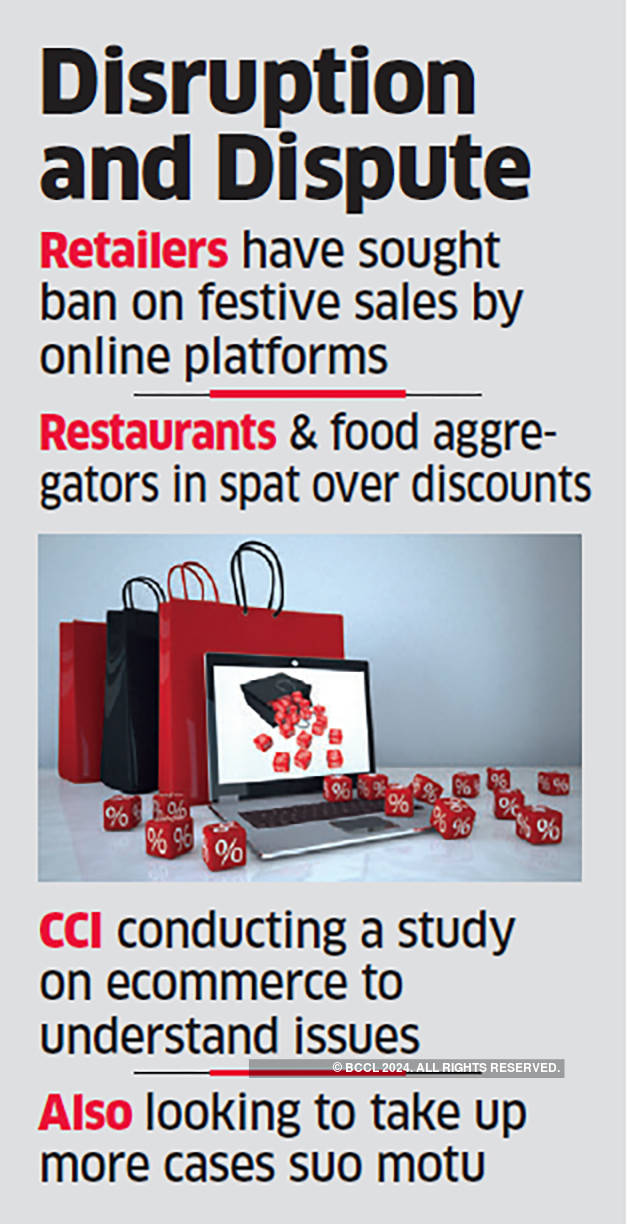 NEW DELHI: India’s competition regulator is closely watching the issue of deep discounting by ecommerce players as it gears up to deal with possible anti-competitive behaviour in the sector.
NEW DELHI: India’s competition regulator is closely watching the issue of deep discounting by ecommerce players as it gears up to deal with possible anti-competitive behaviour in the sector.Deep discounts could make some businesses unviable as it erodes the value of products and services in the mind of the consumer if done for extended periods, Ashok Kumar Gupta, chairperson of the Competition Commission of India (CCI), told ET.
Ecommerce platforms, such as Amazon and Flipkart, are getting ready to launch big sales in the upcoming festival period, and traders’ bodies have opposed the move to offer consumers significant discounts on products during the sale period.
The CCI has initiated a study into the practices of the ecommerce sector. A report on the interim findings has also taken into account the grievances of small businesses.
“Thus, their businesses can become unviable if this (deep discounting) continues for a long time as there is a permanent erosion in the value of the product in the mind of the customer,” Gupta said.
The commission is building expertise to deal with cases involving ecommerce players, he added.
The CCI will, however, balance the interest of both online platforms and small businesses, Gupta said.
He also highlighted the concerns of small restaurants, retailers and hotels who say they are being forced to heavily discount their products and services to compete with ecommerce companies.
“This aspect (deep discounting) was also actively deliberated in the workshop on ecommerce organised by CCI, wherein players who are listed on platforms such as those for online food delivery, hotel booking and retail shopping highlighted their concerns,” he said.
Restaurants have also asked online food aggregators to take a relook at their deep discounting practices, while retailers have asked the government to ban upcoming festive sales by Amazon and Flipkart over alleged violations of foreign direct investment norms. The festive sales begin September 29. In a letter to commerce and industry minister Piyush Goyal on Friday, the Confederation of All India Traders (CAIT) said, “By offering deep discounts ranging from 10% to 80% on their ecommerce portals, these companies are clearly influencing the prices and create an uneven playing field, which is in direct contravention of the (FDI) policy.”

Flipkart said traders on its platform look forward to the festive event as an opportunity and a landmark moment in their financial year. “This edition of Big Billion Days is set to be a huge celebration for the whole country and we are sure the scale of it will serve as an impetus for consumption and demand,” Rajneesh Kumar, chief corporate affairs officer at Flipkart, told ET.
Amazon India highlighted the opportunities offered to the 500,000 sellers on its platform and said that sellers had sole discretion in setting product prices.
“A majority of these (sellers) are small businesses, women entrepreneurs, startups, weavers and artisans, and emerging brands from across India, including remote areas. These sellers offer their selection to customers at prices that they deem fit on our marketplace, thus using the Amazon India marketplace to generate or supplement their income,” said an Amazon spokesperson.
CCI’s Gupta also said that CCI would look to file more cases on its own, as it adopts a more proactive approach to tackle market distortions. “We at CCI are definitely focusing on taking up more suo motu cases. We do not want to get constrained and driven only by filing of information,” he said.
The proceedings that are begun as a result of filing of information by informants often become adversarial, with the informants usually being concerned with their personal grievances, he said. “It is incumbent on us to intervene on our own motion whenever any anti-competitive activity is suspected or observed without waiting for a formal complaint,” Gupta said.
PROTECTING PUBLIC PROCUREMENT
Gupta also said that the watchdog was working with the Government e-Marketplace (GeM) to create software to flag tenders where rigging of bids is suspected.
“The software will raise red flags for suspected bid rigging activity in the bidding process. This will enable the procurer to intervene and take timely corrective action,” he said. The CCI has also conducted two raids this year in cases involving bid rigging in government tenders.
No comments:
Post a Comment